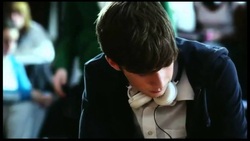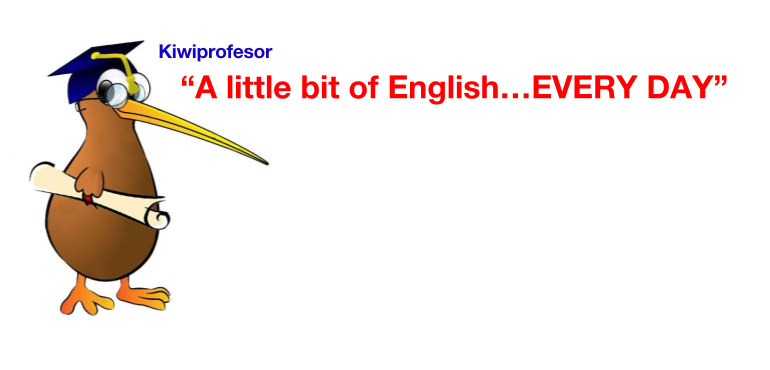❝You can never understand one language until you understand at least two.❞ ‒ Geoffrey Willans

Let's Begin…
When you take a bite of a hot pepper, your body reacts as if your mouth is on fire -- because that's essentially what you've told your brain! Rose Eveleth details the science and history behind spicy foods, giving insights into why some people continue to pay the painful price for a little spice.
Watch the video below, and see your lesson Here
When you take a bite of a hot pepper, your body reacts as if your mouth is on fire -- because that's essentially what you've told your brain! Rose Eveleth details the science and history behind spicy foods, giving insights into why some people continue to pay the painful price for a little spice.
Watch the video below, and see your lesson Here
Foreign language : Expressions followed by the gerund

A Swiss tourist in London was having difficulty understanding the London underground map, so he stopped to ask two Londoners for directions.
‘Excuse me!’ said the Swiss man, ‘I speak no English. Parlez-vous francais?’
The Londoners shrugged their shoulders.
‘It’s no good speaking French to us!’ one of them said. ‘We can’t speak a word of it.’
The Swiss tourist tried again in another language.
‘Sprechen sie Deutsch?’ he asked.
Once again, he met with blank stares from the Londoners.
‘Sorry, mate. It’s a waste of time speaking German to us, either.’
The Swiss tourist tried again.
‘Parlate Italiano?’ he asked.
Again the Londoners met his questions with incomprehension, so the Swiss man had to give up trying. There was obviously no point trying any other languages with them.
As he was walking away, one of the Londoners turned to the other and said, ‘Three languages! That’s impressive. Maybe we should learn another language.’
‘No, there’d be no use learning another language.’
‘Why not?’
‘Well, it didn't do him much good, did it?’
Grammar: expressions followed by gerund :
Some expressions in English are always followed by the gerund (-ing) form. Here are some of the most common phrases:
It’s a waste of time speaking to him.
There’s no use trying to find the book here.
I had difficulty finding my way to the building.
It’s no good speaking to her.
There’s no point learning how to ride a camel.
I gave up trying to cook years ago.
It’s not worth going to that museum.
It’s a waste of money paying for that meal.
Rewrite these sentences so they have the same meanings.
1. I can’t remember phrasal verbs very easily.
I have difficulty…remembering phrasal verbs.
2. It’s unnecessary to help him.
There’s no point…
3. I decided not to wait for them
I gave up…
4. It’s useless to speak to my boss.
There’s no use…
5. Don’t buy that dictionary. There is no advantage.
It’s not worth…
Complete these sentences with a gerund form.
keep see buy find spend
6. I hope you had no difficulty ________ the place.
7. It’s a waste of money ________ food you don’t use.
8. There’s no use ________ a lot of money on her birthday present.
9. The film was very interesting. It was well worth ________.
10. We should throw these papers away. There’s no point ________ them.
Vocabulary exercises :
Match the broken sentences.
1. We stopped the car to ask… A. difficulty with prepositions.
2. Our questions only met… B. a foreign language.
3. The assistant shrugged… C. any good at all.
4. It’s important to learn… D. with blank stares.
5. I sometimes have… E. a word of the language.
6. He didn’t speak… F. for directions.
7. The medicine didn’t do him… G. his shoulders.
Choose the correct word form to complete the sentences.
8. The architecture of the city was very impressed / impressive.
9. I’m afraid he obvious / obviously doesn’t understand a word.
10. Those directions you gave me were completely incomprehensible / incomprehension.
11. The assistant just looked at us blank / blankly when we asked about prices.
‘Excuse me!’ said the Swiss man, ‘I speak no English. Parlez-vous francais?’
The Londoners shrugged their shoulders.
‘It’s no good speaking French to us!’ one of them said. ‘We can’t speak a word of it.’
The Swiss tourist tried again in another language.
‘Sprechen sie Deutsch?’ he asked.
Once again, he met with blank stares from the Londoners.
‘Sorry, mate. It’s a waste of time speaking German to us, either.’
The Swiss tourist tried again.
‘Parlate Italiano?’ he asked.
Again the Londoners met his questions with incomprehension, so the Swiss man had to give up trying. There was obviously no point trying any other languages with them.
As he was walking away, one of the Londoners turned to the other and said, ‘Three languages! That’s impressive. Maybe we should learn another language.’
‘No, there’d be no use learning another language.’
‘Why not?’
‘Well, it didn't do him much good, did it?’
Grammar: expressions followed by gerund :
Some expressions in English are always followed by the gerund (-ing) form. Here are some of the most common phrases:
It’s a waste of time speaking to him.
There’s no use trying to find the book here.
I had difficulty finding my way to the building.
It’s no good speaking to her.
There’s no point learning how to ride a camel.
I gave up trying to cook years ago.
It’s not worth going to that museum.
It’s a waste of money paying for that meal.
Rewrite these sentences so they have the same meanings.
1. I can’t remember phrasal verbs very easily.
I have difficulty…remembering phrasal verbs.
2. It’s unnecessary to help him.
There’s no point…
3. I decided not to wait for them
I gave up…
4. It’s useless to speak to my boss.
There’s no use…
5. Don’t buy that dictionary. There is no advantage.
It’s not worth…
Complete these sentences with a gerund form.
keep see buy find spend
6. I hope you had no difficulty ________ the place.
7. It’s a waste of money ________ food you don’t use.
8. There’s no use ________ a lot of money on her birthday present.
9. The film was very interesting. It was well worth ________.
10. We should throw these papers away. There’s no point ________ them.
Vocabulary exercises :
Match the broken sentences.
1. We stopped the car to ask… A. difficulty with prepositions.
2. Our questions only met… B. a foreign language.
3. The assistant shrugged… C. any good at all.
4. It’s important to learn… D. with blank stares.
5. I sometimes have… E. a word of the language.
6. He didn’t speak… F. for directions.
7. The medicine didn’t do him… G. his shoulders.
Choose the correct word form to complete the sentences.
8. The architecture of the city was very impressed / impressive.
9. I’m afraid he obvious / obviously doesn’t understand a word.
10. Those directions you gave me were completely incomprehensible / incomprehension.
11. The assistant just looked at us blank / blankly when we asked about prices.

Stand up
What does "Stand up" mean?
(Intermediate (B1) – Upper Intermediate (B2) level)
-Look at this worksheet, read the sentences with 'stand up', and match the sentences with the definitions. You have 5 minutes. Notice the different meanings of the phrase 'stand up'.
-Read this sentence " It's time for people who are against discrimination to stand up, and be counted":
What different types of discrimination might the speaker be referring to?
In what ways can people be discriminated against?
In what ways can people who are against discrimination stand up and be counted?
-You are going to watch a short film called 'Stand up". Can you see what type of discrimination is shown, and how people stand up and be counted?
What does "Stand up" mean?
(Intermediate (B1) – Upper Intermediate (B2) level)
-Look at this worksheet, read the sentences with 'stand up', and match the sentences with the definitions. You have 5 minutes. Notice the different meanings of the phrase 'stand up'.
-Read this sentence " It's time for people who are against discrimination to stand up, and be counted":
What different types of discrimination might the speaker be referring to?
In what ways can people be discriminated against?
In what ways can people who are against discrimination stand up and be counted?
-You are going to watch a short film called 'Stand up". Can you see what type of discrimination is shown, and how people stand up and be counted?
The film was commissioned by an organisation 'Belong To' which has a campaign called 'Stand Up!' which fights against homophobic discrimination.
What do you know about the actor Colin Farrell?
He has become involved the Stand Up! anti-homophobic campaign.
You are going to read a statement by Colin Farrell. As you read it, answer the following questions;
What do you know about the actor Colin Farrell?
He has become involved the Stand Up! anti-homophobic campaign.
You are going to read a statement by Colin Farrell. As you read it, answer the following questions;
- What does Colin Farrell wish for?
- What forms of bullying does he mention?
- What do you think is the relationship between Colin Farrell and the other man in the photo?

